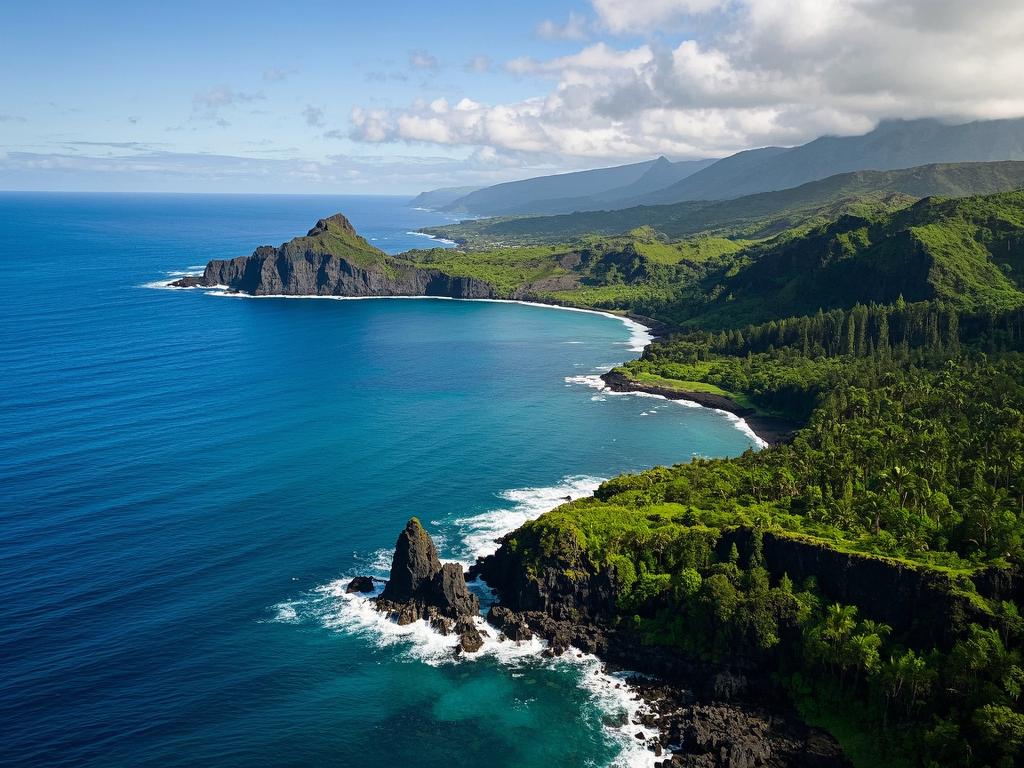
# The Ancient Volcanic Islands of Hawaii: Protecting a Fragile Ecosystem
Hey there, fellow nature enthusiasts! Today, we're diving deep into the mesmerizing world of the ancient volcanic islands of Hawaii and exploring why it's crucial to protect this fragile ecosystem. Brace yourselves for a wild ride filled with fascinating facts, mind-blowing statistics, and a call to action that will leave you itching to make a difference.
## A Geological Marvel
The Hawaiian Islands are a geological wonder, born from the fiery embrace of volcanoes over millions of years. These majestic landforms have shaped the archipelago into a biodiversity hotspot, home to countless unique plant and animal species found nowhere else on Earth. From the towering peaks of Mauna Loa and Kilauea to the lush rainforests of Kauai, every corner of Hawaii is a testament to the power of nature.
But here's the catch: these volcanic islands are incredibly fragile. The thin layer of soil that supports life is constantly being eroded by wind, rain, and human activities. Add to that the threat of climate change, which is causing sea levels to rise, temperatures to increase, and extreme weather events to become more frequent, and you've got a recipe for disaster.
## A Biodiversity Bonanza
One of the most remarkable things about the Hawaiian Islands is their unparalleled biodiversity. With over 10,000 native species, including 90% of which are found nowhere else in the world, Hawaii is a living laboratory of evolution. From the iconic Hawaiian honeycreepers, with their vibrant plumage and unique beak shapes, to the rare and endangered Hawaiian monk seals, these islands are teeming with life.
Unfortunately, many of these species are facing extinction due to habitat loss, invasive species, and other human-induced threats. In fact, Hawaii has the highest rate of species extinction in the United States, with an estimated 25% of its native species at risk of disappearing forever. That's a staggering statistic that should wake us up and make us realize the urgent need to protect these precious ecosystems.
## The Economic Importance of Hawaii's Ecosystem
But it's not just the environment that's at stake here. Hawaii's economy is heavily dependent on its natural beauty and unique ecosystem. Tourism is the state's biggest industry, bringing in billions of dollars each year and supporting thousands of jobs. Visitors come from all over the world to experience the stunning beaches, lush landscapes, and rich culture of Hawaii.
But without a healthy ecosystem, this tourism industry could collapse. Imagine a Hawaii without its vibrant coral reefs, its majestic waterfalls, or its unique wildlife. It would be a shadow of its former self, a place that no one would want to visit. That's why it's so important to protect Hawaii's ecosystem not just for the sake of the environment, but for the sake of the economy as well.
## The Role of Climate Change
One of the biggest threats to Hawaii's ecosystem is climate change. Rising sea levels, warmer temperatures, and more frequent extreme weather events are all taking a toll on the islands. Coral reefs, which are essential to the health of Hawaii's marine ecosystem, are bleaching and dying at an alarming rate due to warmer water temperatures. This not only affects the thousands of species that depend on the reefs for food and shelter, but it also has a major impact on the tourism industry, as coral reefs are a major draw for snorkelers and divers.
In addition, rising sea levels are threatening to inundate low-lying areas of the islands, displacing communities and destroying homes and infrastructure. And with more frequent and intense hurricanes, wildfires, and droughts, Hawaii's natural resources are under increasing pressure.
## What Can We Do?
So, what can we do to protect the ancient volcanic islands of Hawaii and their fragile ecosystem? The first step is to raise awareness. We need to educate ourselves and others about the importance of protecting these precious ecosystems and the threats they face. We also need to take action to reduce our carbon footprint and support sustainable practices.
One way to do this is to support local businesses that are committed to sustainability. By choosing to stay at eco-friendly hotels, eat at farm-to-table restaurants, and use local products, we can help to reduce our impact on the environment and support the local economy.
Another important step is to support conservation efforts. There are many organizations working to protect Hawaii's ecosystem, from the Hawaii Department of Land and Natural Resources to the Sierra Club and the Nature Conservancy. By donating to these organizations, volunteering our time, or simply spreading the word, we can help to make a difference.
Finally, we need to hold our elected officials accountable. We need to demand that they take action to protect Hawaii's environment and support policies that promote sustainability. Whether it's through writing letters, making phone calls, or participating in protests, we have the power to make our voices heard and to effect change.
## Conclusion
In conclusion, the ancient volcanic islands of Hawaii are a precious and fragile ecosystem that is facing numerous threats. From climate change to habitat loss and invasive species, the future of these islands hangs in the balance. But by raising awareness, taking action, and supporting conservation efforts, we can help to protect these precious ecosystems and ensure that they continue to thrive for generations to come.
So, what are you waiting for? Let's all do our part to protect the ancient volcanic islands of Hawaii and their fragile ecosystem. Whether it's by making a small change in our daily lives or by getting involved in a larger conservation effort, every little bit counts. Together, we can make a difference and ensure that these beautiful islands remain a haven for nature and a source of inspiration for us all.
#Hawaii #Ecosystem #Conservation #ClimateChange #Biodiversity

